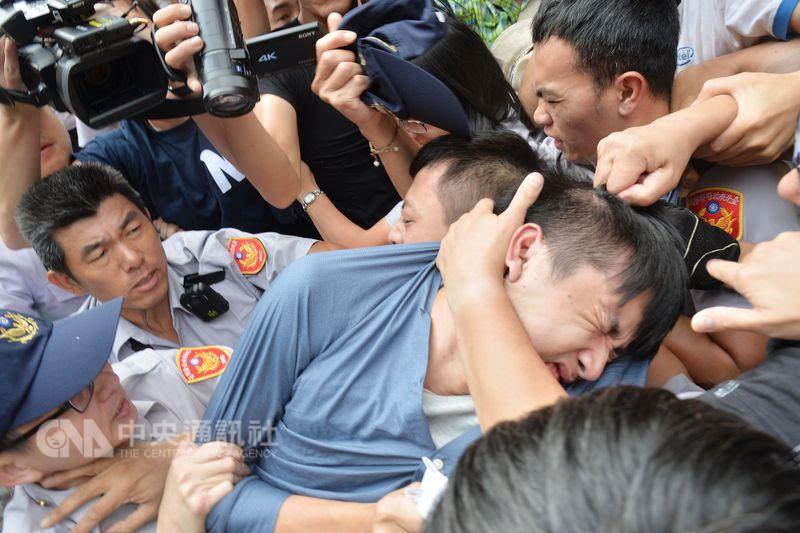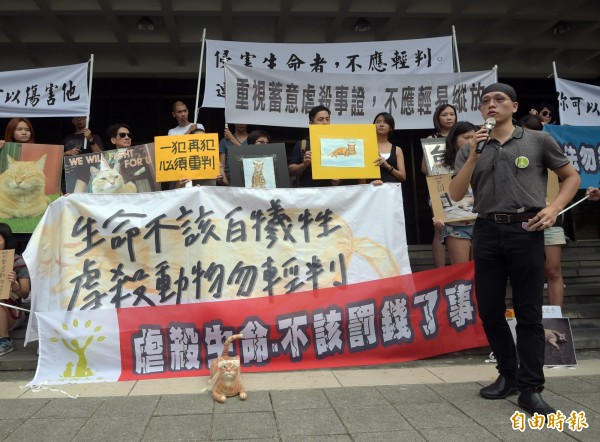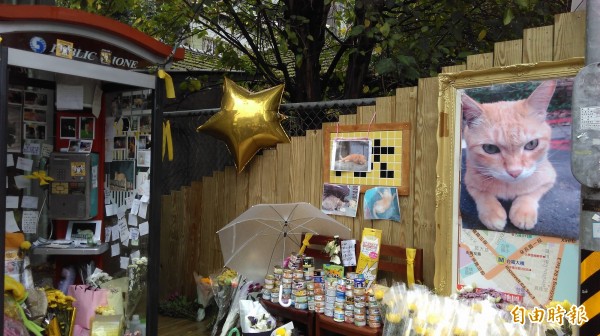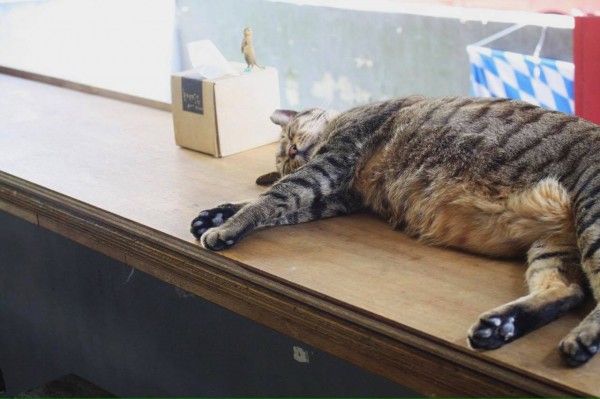by Darice D. Chang
語言:
English
Photo Credit: Apple Daily
Reactions to Recent Cat Killings A Mixed Bag
ON AUGUST 16TH, a college student was violently assaulted as he left the courtroom sentencing for torture and murder of an animal. In the chaos that ensued, a police vehicle was overturned, a bailiff suffered burns on his leg from being pressed against an exhaust pipe as the crowd of about fifty swarmed the defendant, and another bailiff had her foot run over by a car.
This was in stark contrast to the civilized demonstration held by animal rights activists earlier in the morning.
 Chan being attacked by a crowd. Photo credit: CNA
Chan being attacked by a crowd. Photo credit: CNA
The press conference for the trial of National Taiwan University exchange student Perry Chan (陳皓揚) for the murder of stray cat Big Orange (大橘子) was a peaceful one. More than 100 people showed up in muggy 31° C Tuesday morning weather to show their support and concern for animal welfare.
Over a dozen media outlets were on site to record and broadcast the event. The conference was held by the Trees Party and conducted by Secretary-General Jimmy Li.
Chan confessed to the killing of Big Orange on December 28th last year, as well as that of another stray by the name of Ban Ban (‘斑斑’, also translated as ‘Stripes’, ‘Stripey’, or ‘Streaky’ by various English news outlets), who was often seen at About Animals, a vegan and animal/equal rights restaurant in Wanlong. The confession comes about 3 months after incriminating video footage surfaced regarding Chan.
Chan has expressed that he wishes to issue a public apology and would comply with court-ordered community service. Chan is also suspected of killing 3 other cats in Macau. The cats went missing after he went home for the holidays.
Recent highly publicized animal deaths include that of the 7-year-old giraffe Hsiao Chiu (宵久) from Taipei Zoo and the beating and hanging of a stray dog by 6 marine officers in Kaohsiung. Consequently, DPP president Tsai, herself the well-publicized owner of two cats, has issued a public statement calling for stronger protection of animal rights.
Under the Animal Protection Law, Article 25, Chan could face imprisonment of up to 1 year and fines between NT$100,000 (US $3,000) and NT$1 million (US $32,000).
 Press conference held by the Trees Party. Photo credit: Liberty Times
Press conference held by the Trees Party. Photo credit: Liberty Times
Representatives from various animal rights activist groups were present including those from the Trees Party, writer Lu Qiu-yuan, associate professor Wu Zong-xian of the National University of Tainan College of Management, Illustrator My Deer Dog, Taiwan SPCA legal specialist Liu Zi-yu (劉子瑜), and one of Big Orange’s caretakers Wang Xian-ru, a professor of French at NTU.
Chan was an exchange student at NTU from Macau. Several representatives from Macau were at the protest, though they kept their faces hidden. Some angry demonstrators have demanded that Perry be extradited for his crimes. Attendees were encouraged to RSVP accordingly on the Facebook page and click “interested” if unable to attend. At the time of the conference the event page showed over 4,200 interested.
Reactions of Directly Affected Parties
MS. WANG XIAN-RU, a professor of French at NTU who had taken care of Big Orange, was present at Chan’s trial and made a statement to the media that she did not hold any hatred toward the student. Instead, Wang advocated for Chan to receive mental health treatment. “I feel no hatred.” she said in an interview on Apple Daily. “Please get him a counselor to stay with him.”
“I’ve continually stated that I do not hate this student. I am facing this enormous issue, which is Taiwanese society. There is a different issue at hand.” Wang points blame not to Chen himself, but to the societal pressures and inability of a college student to cope, as well as loopholes in the current animal protection laws which previously avoided confronting the issue of animal torture and failed to emphasize the severity of animal cruelty.
 Memorial to Big Orange. Photo credit: Liberty Times
Memorial to Big Orange. Photo credit: Liberty Times
“It is not a minor thing,” she states. “I hope that Taiwan will take note of [Big Orange’s] life. Animals are not objects, animals are living beings, exactly the same a person. We humans are also animals, don’t forget that.”
Similar sentiments were echoed by the proprietors of About Animals (動物誌), the vegan restaurant in Wanlong where Ban Ban was frequently seen. Although reports often referred to Ban Ban as a store cat, the stray was not actually registered by About Animals.
About Animals has issued a statement regarding their stance and wish for learning and self-improvement. Similar to Professor Wang, they emphasize that the issue is with the current social climate and not the individual, taking note of the violent backlash Chan has faced and calling on supporters to use compassion instead of hatred in their reactions to this event.
About Animals reinforces their commitment to ethical treatment of all animals, reminding readers that every meal is an opportunity to choose respect for animals; the statement closes on a magnanimous note, encouraging readers to choose understanding and forgiveness. “Now we want everyone to know that this is an option, that we can and should choose to allow the environment to be one of compassion and mutual respect. We believe there is a power greater than that of hatred there.”
 Ban Ban. Photo credit: About Animals
Ban Ban. Photo credit: About Animals
Despite direct pleas from both directly affected parties to maintain a respectful and understanding environment, the altercation against Chan still occurred. This calls to mind the Little Lightbulb incident, during which the mother of a young girl who was murdered in front of her urged the masses to maintain calm in the face of the incident. But in spite of her urgings, the perpetrator was still beaten by a crowd while being transported between police stations. Perhaps this points to a larger problem of crowds being moved to violence against individuals who otherwise should receive mental healthcare.
Taiwan has long suffered from stigmatization and lack of public knowledge and human resources in dealing with mental health, and a shortage of mental health services and facilities are not uncommon in Taiwan. National Health Insurance does not cover counseling, an important part of psychological care. Mayor Ko Wen-je has echoed sentiments that the problem lies with society at large, saying that with a harmonious society the mentally ill would not need to lash out. Dr. Chan from the Community Services Center, which provides counseling, notes that the government needs to provide more support, pointing to a sluggish economy that causes parents to work long hours and an academic culture that forces children to study even longer, as well as the proliferation of virtual gaming that prevents the human interaction. Fortunately, Tsai Ing-Wen has vowed to make mental health care more available during her tenure as president, but we will see if that happens.

